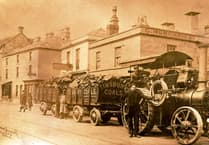THE towns of Midsomer Norton, Frome, and Radstock hold vital pieces of history, woven from prehistoric times through the Roman era and into the industrial age. Over the years, numerous archaeological finds have shed light on the region's vibrant past, offering glimpses into the lives of its ancient inhabitants.
Midsomer Norton: A Window into Roman Britain
The remains of Roman roads and possible villa sites highlight the strategic importance of this location in ancient times, and indicate the area's prosperity and its connections to broader Roman trade networks.
By Silver Street, an archeological dig found evidence of a farm and human activity dating to the Roman period. ‘The main episode of activity occurred during the Roman period (2.1–2.3) with the establishment of a farmstead during the 1st century AD. It was defined by an enclosure that was reworked several times over the course of the 2nd to 4th centuries. A small quantity of Mid to Late Iron Age and Late Iron Age/early Roman pottery was recovered from the excavation area.’
Frome: Unearthing Medieval and Saxon Treasures
Frome, with its narrow streets and historic buildings, has long fascinated historians and archaeologists alike. The town's origins date back to the Saxon era, and numerous finds have provided insights into its early development.
In 2010, a metal detectorist made a sensational discovery in a field near Frome: the Frome Hoard. Unearthed in 2010 by local metal detectorist Dave Crisp, it comprises 52,503 Roman coins contained in a ceramic pot, and has been dated to the period AD 253 to 293. This collection of over 52,000 Roman coins is one of the largest ever found in Britain. Buried in a large pot, the hoard includes coins minted during the reign of several Roman emperors. The sheer scale of the hoard suggests it may have been a communal offering or a hidden treasure intended to be retrieved later.

Frome's medieval past is also well-documented through archaeological finds. Excavations in the town center have revealed remnants of medieval buildings, pottery, and everyday items, painting a vivid picture of life in a bustling market town during the Middle Ages.
Radstock: Echoes of the Industrial Age
Radstock, once a thriving coal mining town, has a different but equally fascinating archaeological narrative. The town's industrial heritage is evident in the remains of its once-prominent coal mines and associated infrastructure.
Archaeological surveys in Radstock have uncovered the remnants of 19th-century mine buildings, railways, and workers' cottages. These finds provide a tangible connection to the town's role in the Industrial Revolution and its impact on the local community.
A particularly significant discovery in Radstock was the unearthing of a medieval settlement beneath the modern town. This earlier layer of habitation included building foundations, pottery shards, and agricultural tools, indicating that Radstock's history extends far beyond its industrial era.
The Importance of Local Archaeology
The archaeological finds in Midsomer Norton, Frome, and Radstock are more than just remnants of the past; they are vital pieces of the puzzle that help us understand the historical trajectory of Somerset.
Local museums, such as the Radstock Museum and Frome Museum, play a crucial role in preserving and displaying these artefacts, making history accessible to the public. They provide educational opportunities and foster a deeper appreciation for the region's rich heritage.





Comments
This article has no comments yet. Be the first to leave a comment.